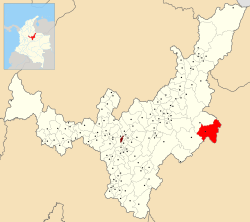Paya, Boyacá facts for kids
Quick facts for kids
Paya
|
||
|---|---|---|
|
Municipality and town
|
||
|
||

Location of the municipality and town of Paya in the Boyacá department of Colombia
|
||
| Country | ||
| Department | Boyacá Department | |
| Province | La Libertad Province | |
| Founded | 14 September 1600 | |
| Area | ||
| • Municipality and town | 435.503 km2 (168.149 sq mi) | |
| • Urban | 225.503 km2 (87.067 sq mi) | |
| Elevation | 950 m (3,120 ft) | |
| Population
(2015)
|
||
| • Municipality and town | 2,550 | |
| • Density | 5.855/km2 (15.165/sq mi) | |
| • Urban | 580 | |
| Time zone | UTC-5 (Colombia Standard Time) | |
| Website | Official website: http://www.paya-boyaca.gov.co/ | |
Paya is a small town and a special kind of area called a municipality in Colombia. It's located in the Boyacá Department, specifically within the La Libertad Province. Paya shares its borders with other towns like Pisba and Labranzagrande in Boyacá. It also borders Támara, Nunchía, and Yopal in the nearby Casanare Department.
Contents
What Does Paya Mean?
The name Paya comes from the ancient Chibcha language. In this language, Paya means "People of hope." This gives us a clue about the history and spirit of the people who lived there long ago.
A Look Back at Paya's History
Before the Spanish arrived in the 1530s, the area where Paya is now was home to the Muisca people. The Muisca were an important group of people in Colombia. They lived in a loose group of communities called the Muisca Confederation.
The modern town of Paya was officially started on September 14, 1600. This date marks when the town began to grow into what it is today.
How Paya Makes a Living
The people of Paya mostly earn their money through different types of farming.
Growing Plants and Crops
- Horticulture is the biggest part of Paya's economy, making up 47%. This means growing fruits, vegetables, flowers, and other plants.
- Agriculture is also important, contributing 16% to the economy. This includes growing various crops.
Raising Animals
- Livestock farming is another major source of income, accounting for 37%. This involves raising animals like cows, pigs, or chickens.
See also
 In Spanish: Paya (Boyacá) para niños
In Spanish: Paya (Boyacá) para niños
 | Sharif Bey |
 | Hale Woodruff |
 | Richmond Barthé |
 | Purvis Young |


